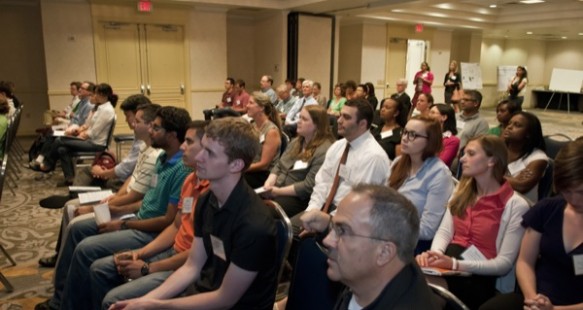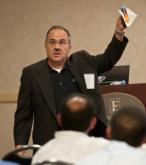
The Delaware Biotechnology Institute (DBI) hosted the 2013 Research Symposium on Aug. 22 to highlight the exciting research being performed by the Delaware Bioscience Center for Advanced Technology (CAT) researchers and National Science Foundation IGERT students. The event drew more than 115 participants from academic and bioscience companies in Delaware.
The symposium provided a forum for CAT scientists and businesses to showcase the impact of their research and how their partnership is key for achieving their project goals. The day also included presentations by students in the Systems Biology of Cells in Engineered Environments (SBE2) IGERT program, a multi-disciplinary doctoral traineeship program funded by the National Science Foundation.
The centerpiece of the Bioscience CAT is a grant program that links Delaware academic and industrial communities to help reduce the technology innovation gap and promote economic development in the state. In the past year alone, the $1 million CAT grant program funded by the state has been matched by more than $6 million in federal and industrial funds, and has created or retained 98 direct science-based jobs.
Organizations that have received and benefited from previous CAT grant awards include the A.I. DuPont Hospital for Children, Agilent Technologies, Dynasep Inc., Elcriton Inc., Evozym Inc., Fraunhofer Center for Molecular Biotechnology, H2OPE Biofuels, Heritage Breeders LLC, Lotus Separations, SDIX, Inc., Supercritical Fluid Technologies Inc., the University of Delaware, and Wilmington PharmaTech.
The event included oral and poster presentations and was open to regional bioscientists, as well as members of the public.
“The day provided a great opportunity to learn more about the exciting advancements made possible through the academic and industrial partnerships generated by the CAT grant program,” said Kelvin Lee, director of the Delaware Biotechnology Institute and Gore Professor of Chemical Engineering at the University of Delaware. “The presentations were a clear example of how these partnerships can facilitate cutting edge research and new discoveries in areas such as agriculture, the environment, and human health.”
Talks given by CAT researchers were judged based on “science communication” and the winning presentation was awarded an additional $15,000 towards their CAT research project.
E. Terry Papoutsakis, Eugene du Pont Chair of Chemical and Biomolecular Engineering and professor of biological sciences at UD, was selected as the winner for his talk titled “Another Man’s Treasure: Biofuel from Biodiesel-derived Glycerol Waste” highlighting his partnership with Elcriton, a local start-up company focused on addressing sustainable energy and chemical production needs of the U.S.
Their project is investigating if glycerol, a waste product in biodiesel production, can be used to generate butanol, a second generation biofuel.
“This is really what the CAT program is all about … collaborations, creating a new culture, and developing game-changing technologies,” said Papoutsakis. “When we started, I could not have imagined that this would have worked as well as it did for all parties involved. I cannot be more thankful to and supportive of the CAT program. It should be continued and expanded. The state of Delaware does a lot of things right, and this surely is one of them.”
The event drew representatives from more than 30 companies and academic organizations, including AstraZeneca, Christiana Care Health System, DuPont, Delaware Technical Community College, Delaware State University, Nemours, Siemens, and UD.
The day ended with a networking reception to help facilitate the development of future collaborations.
Article by Katie Lakofsky
Photos by Doug Baker

E. Terry Papoutsakis, Eugene du Pont Chair of Chemical and Biomolecular Engineering and professor of biological sciences at UD, addresses the 2013 Research Symposium.